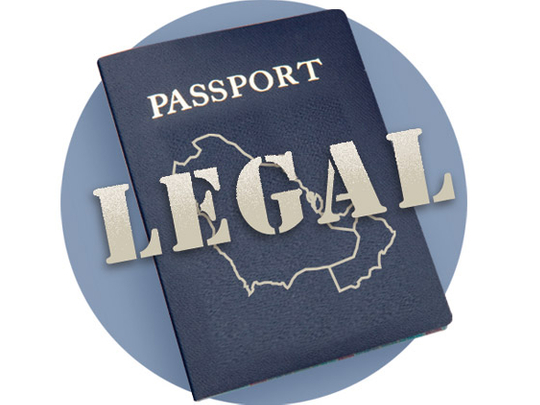
Like most Gulf States, Kuwaiti institutions were unable, some would argue unwilling, to manage their burgeoning expatriate populations that were critical to their development.
For decades, ruling elites focused on how best to advance various state institutions while satisfying the nascent entrepreneurial classes that surfaced after the oil boom and that competed with the more established merchant families.
A necessary governance system was thus created based on the kafeel mechanism, whereby citizens would sponsor, employ, and otherwise guarantee the "legal situation" of migrant workers toiling in the country.
Why then did Kuwait follow Bahrain in scrapping the much-criticised sponsorship system and will the remaining four GCC states implement similar laws next year?
According to Mohammad Al Afasi, the Minister of Social Affairs and Labour, the kafeel system was the country's "gift to foreign workers on the anniversary of Kuwait's liberation" from seven months of Iraqi occupation in 1991. This was a much-delayed present although Bahraini authorities were more forthcoming in 2009 when they concluded that such sponsorships were unhealthy, akin to the practice of "modern-day slavery."
It was necessary to abolish their outdated law, Manama argued, because it was finally persuaded that employers exercised merciless authority over uneducated and relatively weak individuals who could be, and in some instances were, abused.
This did not mean that most sponsors were engaged in sadistic behaviour but that enough cases emerged over the years to tarnish the otherwise unblemished reputations of honest employers.
It was, to put it mildly, an overdue decision to restore faith in a perfectly acceptable exchange, labour for money, even if the employee was still paid pittances. In fact, what the cancellation of the sponsorship system actually means in Bahrain — and starting in February 2011 in Kuwait — is that an expatriate worker can now change positions after three years of service without seeking his or her sponsor's permission.
Likewise, an employee will then be allowed to transfer residence permits by committing to a second contract, again without the authorisation of the original sponsor.
Tougher stance on violations
While the Kuwaiti law is replacing a law that favoured employers, and although the new legislation will significantly improve living conditions — by guaranteeing annual leaves, ensuring end of service indemnities and paid holidays — it also codifies stricter conditions for those who infringe on its provisions.
Visa traders, long engaged in what appeared to be a pastime for rentier merchants, are henceforth forbidden. Prescribed jail terms for those who recruit expatriate workers and then abandon them will hopefully deter most against taking advantage of this loophole, even if this stands out as a critical weakness in the legislation. Nevertheless, the concession appeared to be necessary, especially when it was balanced by a higher minimum wage.
Action against those trafficking migrant workers and, even worse, committing specific human rights violations, including forcing employees to endure long working hours with no time off, beatings, sexual assaults, or the withholding of wages — all of which are criminal offences in all Gulf States — is rare, even when affected employees lodge complaints.
Ironically, a few cases reach Human Rights Watch or similar international organisations that rightly pursue them, but which are quickly sensationalised, as they take on a life of their own.
Most of these instances garner additional criticisms by diplomats stationed in the region who must legally defend their citizens without jeopardising their respective countries' ties with host nations. The end result is serious harm all around.
It is because of such contexts that past kafeel mechanisms failed. Paradoxically, abusive employer behaviours were blocked by perfectly legal procedures in place, anachronisms of a bygone era that was best relegated to the dustbins of history. Needless to say, mentalities were not easy to change either, though responsible individuals welcomed the new laws as signs of real socio-economic reforms.
In the future, domestic workers, street cleaners, sales associates, company managers, construction recruits, and all other migrant hands in Kuwait will see their day-to-day activities regulated by fresh labour laws.
It took the Kuwaiti government an invasion and liberation to move on this overdue track. Sarcastically, it took the National Assembly even longer to debate the critical topic, albeit when the institution was not in suspension, to prod a wary leadership into action.
Sensitive to concerns
By adopting key reforms in the kafeel systems, both Bahrain and Kuwait have shown that they are finely attuned to criticism from international human rights groups as far as violations are concerned.
Admittedly, the conditions of foreign workers, whose numbers stand at nearly 20 million throughout the Gulf region, was an existential dilemma vis-à-vis indigenous populations.
In reality, no contemporary Gulf economy would survive where it not for expatriate labour. Expatriate workers add value. While most were too frightened or too dignified to complain about poor living and labour conditions, most knew that their sacrifices supported entire families in their home-states.
Bahrain and Kuwait have highlighted this basic human dilemma in their midst and committed to higher norms, which ought to quickly be expanded elsewhere throughout the Gulf region. It is the right thing to do.
Dr Joseph A. Kechichian is a commentator and author of several books on Gulf affairs.










